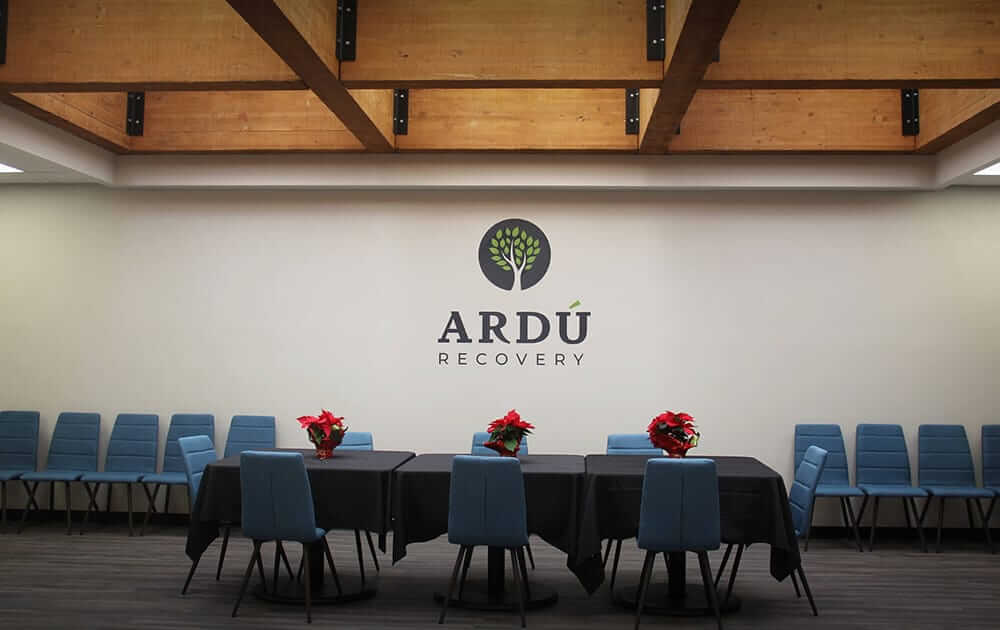Written by Drew Redd. Mina Draskovic, B.Psy., reviewed this content for accuracy.
Ambien is a widely prescribed sleep medication, but it has a high potential for addiction. Physical dependence and psychological addiction to Ambien may have severe consequences for mental and physical health.
In 2015, approximately 3.8 million U.S. adults reported using zolpidem (Ambien). More than 75% of users did not follow safety guidelines to minimize risks, with many taking Ambien alongside other central nervous system depressants, increasing the risk of dependence and addiction.
There is hope. The sooner you face your Ambien addiction, the sooner you can begin your journey to recovery with Ardu. Our specialized Ambien rehab services will address the unique challenges of sleep medication dependence.
Ambien, also known by its generic name zolpidem, is a prescription drug primarily used to treat insomnia. It’s a sedative-hypnotic medication belonging to a class of drugs called nonbenzodiazepine receptor agonists. They are central nervous system depressants that work by enhancing the effects of GABA, a neurotransmitter that promotes sleep and relaxation.
Ambien is primarily prescribed for the short-term treatment of sleep-onset insomnia characterized by difficulty falling asleep. It works by reducing the time it takes for a person to fall asleep, making it ideal for those who struggle with racing thoughts or anxiety when trying to initiate sleep. It’s less effective for sleep-maintenance insomnia, where the primary issue is staying asleep throughout the night.
For those with mixed insomnia patterns, doctors may consider the extended-release version of Ambien or alternative treatments. It’s typically recommended for use for 7–10 days because longer use can lead to tolerance and dependence.
While Ambien is primarily approved for treating insomnia, some healthcare providers may prescribe it for off-label uses. One common off-label use is managing jet lag. It may also be prescribed for certain parasomnias or other sleep disorders. These off-label uses are not FDA-approved.
Because of its potential for abuse and dependence, Ambien is a Schedule IV controlled substance in the United States.
Ambien addiction can develop subtly, often beginning with a legitimate prescription for insomnia. Prolonged use or misuse can quickly spiral into physical dependence and psychological addiction. The drug’s ability to induce sleep quickly and its potential for euphoric effects in some users make it particularly susceptible to abuse.
The most common reasons people get addicted to Ambien:
Co-occurring mental health issues and substance abuse often feed into each other. Conditions such as anxiety, depression, or PTSD can drive people to self-medicate with substances such as Ambien, while substance use disorder (SUD) exacerbates or even triggers mental health problems.
Ardu’s dual diagnosis treatment program recognizes the interconnected nature of these issues and addresses both simultaneously, providing integrated care that targets both the addiction and the underlying mental health condition.
When used improperly or for an extended period of time, Ambien leads to misuse and addiction. Here’s how to recognize the signs of Ambien abuse:
If you or someone you know exhibits any of these signs, they may have a problem. Seek professional medical advice and find an addiction treatment program that can address the root of Ambien addiction.
Ardu Recovery Center will guide you through your rehab journey to overcome your addiction.
Ambien addiction can have serious and far-reaching health consequences that extend beyond disrupted sleep patterns. Here are some of the significant health implications of Ambien addiction:
One of the most dangerous health implications of Ambien abuse is its high risk of overdose.
Ambien is a potent sedative-hypnotic. When you take it in larger doses than prescribed or combine it with other central nervous system depressants, you can overdose on Ambien. The risk of overdose increases significantly when Ambien is mixed with alcohol, opioids, or other sedatives.
Signs of an Ambien overdose may include:
If you suspect an Ambien overdose, it’s crucial to seek immediate medical attention.
Ardu offers comprehensive treatment programs for those struggling with Ambien addiction, addressing both the physical dependence and underlying issues contributing to substance use disorder. Our medical professionals provide a safe detoxification process and personalized treatment plans to prevent the dangers of overdose and support long-term recovery.
At Ardu Recovery Center, we recognize the unique challenges of Ambien addiction and are dedicated to supporting you throughout your recovery journey. Our comprehensive treatment approach is tailored to address your specific needs, ensuring personalized care that targets the root causes of your addiction.
Our range of therapies and programs for Ambien addiction include:
The first step in your journey to an Ambien-free life is detox.
“…The spiritual foundation that Ardu cultivates, is palpable and life changing. I found my purpose in life, while at Ardu, to boot. I have healthy, sober connections, and lifelong friendships in my life now. I am so grateful for my journey. I have so much love for Ardu. Thank you!”
During our Ambien detox program, our medical team will closely monitor your progress, ensuring your safety and comfort as your body adjusts to life without the medication. Our experienced staff will develop an individualized treatment plan tailored to your unique needs and history with Ambien use.
We provide 24/7 care and may use appropriate medications to alleviate withdrawal symptoms, which can include rebound insomnia, anxiety, and in some cases, seizures. We often combine traditional medical approaches with holistic methods. Our holistic detox offers nutritional therapy, mindfulness practices, and gentle exercise to restore natural sleep patterns and reduce anxiety.
With personalized medical oversight and therapies tailored to your needs, our detox center focuses not just on managing withdrawal, but on establishing healthy sleep habits and coping mechanisms for long-term recovery. After detox, you will transition into our comprehensive addiction treatment program, where you’ll build a strong foundation for recovery from Ambien addiction.
At our Ambien rehab center, we provide compassionate care to help you overcome addiction and restore healthy sleep patterns. Our team will work with you to create a personalized treatment plan that may include:
Our inpatient and outpatient treatment programs are tailored to your unique needs. The inpatient program provides round-the-clock structured support and intensive therapy daily, with constant access to medical care and counseling. Outpatient treatment offers flexibility to maintain your personal life while receiving regular support. This option is ideal for those with milder Ambien dependence or as a step-down from inpatient care.
Both programs emphasize long-term recovery strategies, helping you develop natural methods to improve sleep quality without relying on medication. Our goal is not just to end Ambien addiction, but to help you achieve restful, restorative sleep naturally for overall better health and well-being.








Ardu will help you identify and address the underlying issues contributing to your Ambien addiction. Our program equips you with effective sleep hygiene techniques, stress management tools, and coping strategies necessary to maintain your recovery long after you leave our facility.
With the right support and guidance, you can break free from Ambien dependence and develop healthy sleep patterns for a more balanced life. At Ardu, we believe in treating not just the addiction, but the whole person. Our goal is to help you achieve restful sleep naturally and improve your overall well-being.
Contact Ardu today to schedule a tour and learn more about our comprehensive Ambien addiction treatment program.
If you want to verify your health insurance coverage, gather more payment information, and pursue the Medicaid redetermination process in Utah, visit our insurance verification page.

Drew Redd is the executive director of Ardu Recovery Center and is dedicated to empowering people on their journey to sobriety.
Ambien rebound insomnia typically lasts 1–3 nights after you discontinue the medication. For some people, especially those who have used Ambien long-term, it may persist for 1–2 weeks. The severity and duration are influenced by the dosage, duration of use, and individual physiology.
Quviviq (daridorexant) is a newer sleep medication that works differently than Ambien. While it may have a lower risk of next-day impairment and less potential for abuse, long-term safety data is still limited. Both medications have potential side effects and risks. The choice between them should be made in consultation with a healthcare provider based on individual needs and medical history.
Ambien (zolpidem) is not a benzodiazepine. It’s classified as a non-benzodiazepine hypnotic, often called a “z-drug.” While it works similarly to benzodiazepines by enhancing GABA activity in the brain, it’s more selective in its binding and was developed as an alternative to benzodiazepines with potentially fewer side effects and lower abuse potential.
In terms of sedative effects, some drugs considered stronger than Ambien include benzodiazepines like Halcion (triazolam) or Restoril (temazepam), and barbiturates. “Stronger” doesn’t mean better or safer. These medications often carry higher risks of side effects and dependence. The goal is to find the most appropriate medication at the lowest effective dose, not necessarily the strongest option.
Ambien primarily affects the brain by enhancing GABA activity, but it can impact multiple organs. It’s metabolized by the liver, so prolonged use can strain this organ. It also affects the central nervous system, potentially impacting coordination and cognitive function. Some users experience gastrointestinal side effects, and in rare cases, it can affect the cardiovascular system.
It’s not recommended to take another dose of Ambien if you wake up in the middle of the night. Doing so can increase the risk of side effects, including next-day drowsiness and complex sleep behaviors. If sleep problems persist, consult your healthcare provider about adjusting your treatment plan or exploring alternative options.
Melatonin and Ambien work differently and are suited for different situations. Melatonin is a natural hormone that regulates sleep-wake cycles and is generally considered safer with fewer side effects. However, it may not be as effective for severe insomnia. Ambien is more potent but carries risks of side effects and dependence. The choice depends on the severity of sleep issues and should be made in consultation with a healthcare provider.
While Ambien is metabolized by the liver, it’s not typically considered “hard” on this organ when used as prescribed in healthy individuals. Long-term use or misuse can strain the liver. People with pre-existing liver conditions or those who combine Ambien with alcohol may be at higher risk for liver problems.
In most cases, memory issues related to Ambien use are temporary and reversible once the medication is discontinued. Long-term or high-dose use may lead to more persistent cognitive effects. If you’re experiencing memory problems while using Ambien, consult your healthcare provider. They may adjust your dosage or recommend alternative treatments to minimize these side effects.
Moore, T. J., & Mattison, D. R. (2018). Assessment of Patterns of Potentially Unsafe Use of Zolpidem. JAMA Internal Medicine, 178(9), 1275. https://doi.org/10.1001/jamainternmed.2018.3031
Top 10 drugs that cause kidney damage
The basics of meditation therapy